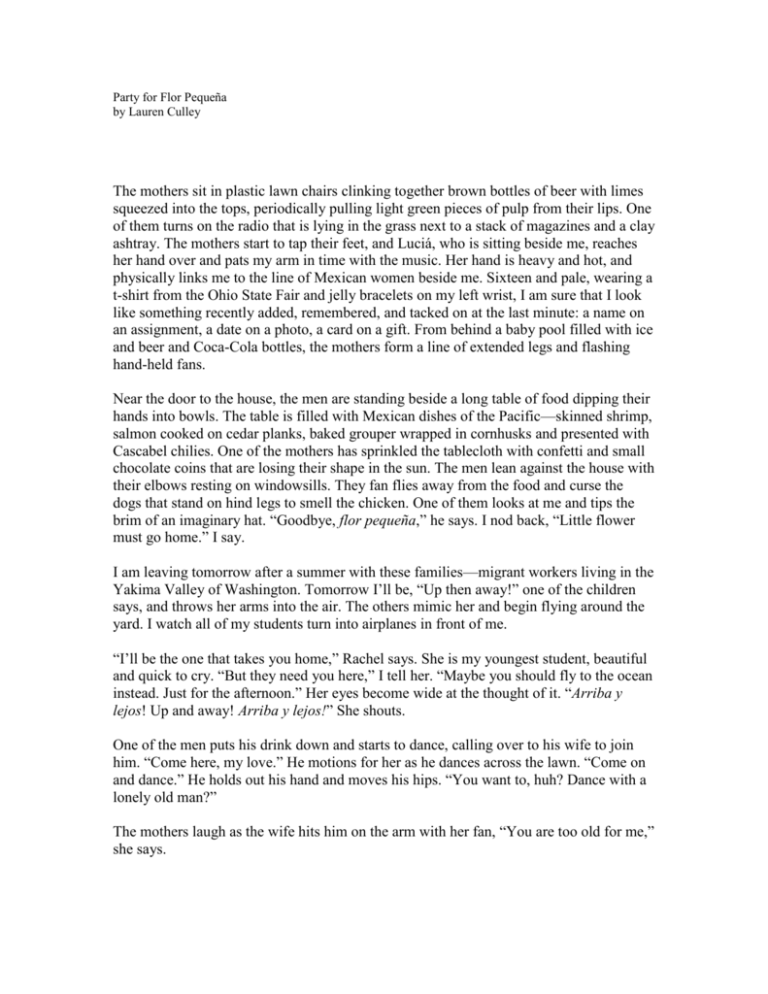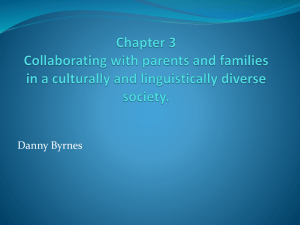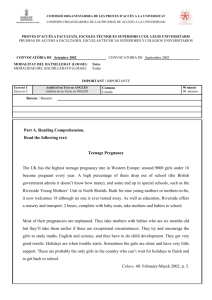The mothers sit in plastic lawn chairs clinking together brown bottles
advertisement

Party for Flor Pequeña by Lauren Culley The mothers sit in plastic lawn chairs clinking together brown bottles of beer with limes squeezed into the tops, periodically pulling light green pieces of pulp from their lips. One of them turns on the radio that is lying in the grass next to a stack of magazines and a clay ashtray. The mothers start to tap their feet, and Luciá, who is sitting beside me, reaches her hand over and pats my arm in time with the music. Her hand is heavy and hot, and physically links me to the line of Mexican women beside me. Sixteen and pale, wearing a t-shirt from the Ohio State Fair and jelly bracelets on my left wrist, I am sure that I look like something recently added, remembered, and tacked on at the last minute: a name on an assignment, a date on a photo, a card on a gift. From behind a baby pool filled with ice and beer and Coca-Cola bottles, the mothers form a line of extended legs and flashing hand-held fans. Near the door to the house, the men are standing beside a long table of food dipping their hands into bowls. The table is filled with Mexican dishes of the Pacific—skinned shrimp, salmon cooked on cedar planks, baked grouper wrapped in cornhusks and presented with Cascabel chilies. One of the mothers has sprinkled the tablecloth with confetti and small chocolate coins that are losing their shape in the sun. The men lean against the house with their elbows resting on windowsills. They fan flies away from the food and curse the dogs that stand on hind legs to smell the chicken. One of them looks at me and tips the brim of an imaginary hat. “Goodbye, flor pequeña,” he says. I nod back, “Little flower must go home.” I say. I am leaving tomorrow after a summer with these families—migrant workers living in the Yakima Valley of Washington. Tomorrow I’ll be, “Up then away!” one of the children says, and throws her arms into the air. The others mimic her and begin flying around the yard. I watch all of my students turn into airplanes in front of me. “I’ll be the one that takes you home,” Rachel says. She is my youngest student, beautiful and quick to cry. “But they need you here,” I tell her. “Maybe you should fly to the ocean instead. Just for the afternoon.” Her eyes become wide at the thought of it. “Arriba y lejos! Up and away! Arriba y lejos!” She shouts. One of the men puts his drink down and starts to dance, calling over to his wife to join him. “Come here, my love.” He motions for her as he dances across the lawn. “Come on and dance.” He holds out his hand and moves his hips. “You want to, huh? Dance with a lonely old man?” The mothers laugh as the wife hits him on the arm with her fan, “You are too old for me,” she says. “Too bad a dancer,” calls out another. They all laugh and look away, look back again to see what he will do. The man pretends to be struck in the heart by their words and stumbles backwards. The mothers call out to him to stop pretending. He is not hurt, they say. No, they are more in pain than he—they had to see him dance. “Stop!” they say, covering their eyes from his dancing, laughing behind their hands. “Stop before we split a side!” I lean forward to watch all of the women, rocking back and forth as they laugh, dropping their fans in their laps to wipe their eyes. The children look up from their game and watch their parents play, watch the man hold his heart and the wife wink back. She blow him a kiss from her chair, publicly flattered, blushing. “He’s all yours!” Luciá calls out, and looks over at me, laughing. The men beside the table lightly punch the husband on the arm, “She’s your piece of ice,” they say. One mother turns up the radio. “This is how you dance,” she says, standing up. Flipping her fan open, she covers all of her face but her eyes. She stomps her foot and throws her head back. Luciá reaches over to take my hand. She brings it to her mouth and kisses my wrist. “This was a good party for you, yes? This was a good time? This was a good time.”





